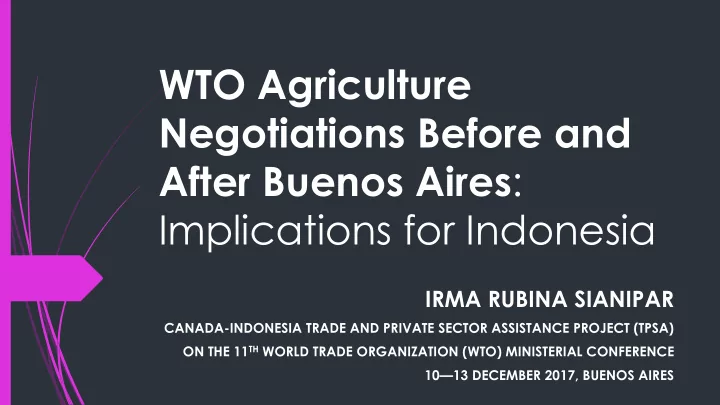

WTO Agriculture Negotiations Before and After Buenos Aires : Implications for Indonesia IRMA RUBINA SIANIPAR CANADA-INDONESIA TRADE AND PRIVATE SECTOR ASSISTANCE PROJECT (TPSA) ON THE 11 TH WORLD TRADE ORGANIZATION (WTO) MINISTERIAL CONFERENCE 10 — 13 DECEMBER 2017, BUENOS AIRES
Why agricultural sector ? ➢ In Developing Countries play o Agriculture a crucial o Rural Development role in redu- ➢ These sectors cing poverty - contribute a large share of GDP - primary source of employment
Three Main Elements of the Agreement Market Access Domestic Subsidies Export Subsidies In addition, special concerns of developing countries and net food importing countries are also addressed.
MARKET ACCESS Tariffication of Non Tariff Barriers (NTB’s) Reduction of Tariffs ➢ By a simple average of 36% over 6 years for developed countries ➢ By a simple average of 24% over 10 years for developing countries Minimum Access ➢ Not les than 3%, rising to 5% by 2004 for developing countries
DOMESTIC SUPPORT Aggregate Measurement of Support (AMS) - Product Specific - Non-Product Specific De Minimis Provisions Three Categories of Domestic Support - Green Box - Blue Box - Amber Box
DOMESTIC SUPPORT Green Box measures include all publically funded government programmes which do not provide price support to producers. For example: Research, pest and desease control, marketing and promotion services, infrastructure, public stock holding, payments under environment programmes etc. *This measures are considered least trade distorting and hence are exempt from reduction.
DOMESTIC SUPPORT Blue Box refer to direct payments under production limiting programmes, which are also not subject to reduction commitments Amber Box include product specific support as well as non-product specific support extended to the farm sector. These are subject to reduction above the de minimis
DOMESTIC SUPPORT Other exemption include: Investment subsidies in the Agriculture Sector Input support to low income/resource poor farmers Support for diversification from illicit narcotic crops
EXPORT SUBSIDIES Prohibited Otherwise subject to reduction commitments - Value of Subsidy - Quantity of Export
Development of Agriculture Negotiation 2017 2015 ? 2013 2011 2009 2005 2003 2001
Way forward to Buenos Aires Key issues in Agriculture that are expected to be deliverables in MC-11 Public stockholding for food security (PSH) Domestic Support Special Safeguard Mechanism (SSM) Transparency on Export Restriction and Prohibition
Public Stockhoding for Food Security (PSH) Proposals: JOB/AG/105 (G33 Group) JOB/AG/99 (EU, Brazil, Columbia, Peru, Uruguay) JOB/AG/118 (Russia & Paraguay) JOB/AG/125 (Norway & Singapore)
Domestic Support Proposals: JOB/AG/92 (CAIRNS Group) JOB/AG/99 ( EU & Brazil) JOB/AG/100 (NZ, Australia, Canada, & Paraguay) JOB/AG/114 (NZ, Australia, Canada, & Paraguay)
Domestic Support Proposals Cont’d… JOB/AG/102 (China & India) JOB/AG/112 ( ACP Group) JOB/AG/120 (Argentina) JOB/AG/124 (Mexico) JOB/AG/127 (Philipina) JOB/AG/126 (Chinese Taipei) JOB/AG/129 (Russia)
Special Safeguard Mechanism Proposal JOB/AG/29 (G33 Group) followed by technical paper TN/AG/GEN/45 & JOB/AG/96 JOB/AG/111 (G33 Group)
MAJOR COUNTRY POSITIONS G33 USA, EU, Japan, Cairns Group
WHAT HAPPENED IN BUENOS AIRES.. ?? Big gap amongst Members the United States played big part in blocking the progress NO DEAL ACHIEVED !!!...
NO MEANINGFUL IMPLICATION OF MC -11 TO INDONESIA !!!... No agreement in PSH interim solution on PSH (Bali Package) will remain in effect SSM as part of Nairobi package will also remain in effect
WHAT CAN INDONESIA DO NEXT ?... ➢ Encourage the revival of agricultural negotiation ➢ Indonesia can analyses all offered proposals, tries to make more flexible position in the upcoming agriculture negotiations, observe in which Indonesia can play as mediator to encourage agreement, but of course .. Without neglect national interests !
Recommend
More recommend